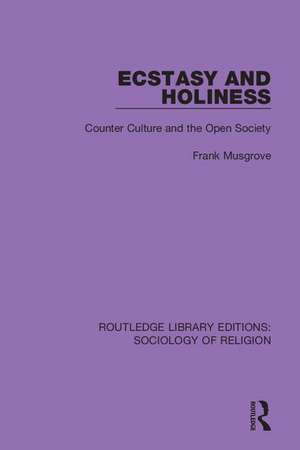Ecstasy and Holiness: Counter Culture and the Open Society: Routledge Library Editions: Sociology of Religion
Autor Frank Musgroveen Limba Engleză Paperback – 15 sep 2020
| Toate formatele și edițiile | Preț | Express |
|---|---|---|
| Paperback (1) | 323.23 lei 6-8 săpt. | |
| Taylor & Francis – 15 sep 2020 | 323.23 lei 6-8 săpt. | |
| Hardback (1) | 788.11 lei 6-8 săpt. | |
| Taylor & Francis – 27 mar 2019 | 788.11 lei 6-8 săpt. |
Din seria Routledge Library Editions: Sociology of Religion
- 34%
 Preț: 6971.44 lei
Preț: 6971.44 lei -
 Preț: 323.23 lei
Preț: 323.23 lei -
 Preț: 218.38 lei
Preț: 218.38 lei -
 Preț: 323.23 lei
Preț: 323.23 lei -
 Preț: 317.18 lei
Preț: 317.18 lei -
 Preț: 323.23 lei
Preț: 323.23 lei -
 Preț: 323.23 lei
Preț: 323.23 lei -
 Preț: 323.23 lei
Preț: 323.23 lei -
 Preț: 323.23 lei
Preț: 323.23 lei -
 Preț: 323.23 lei
Preț: 323.23 lei -
 Preț: 313.99 lei
Preț: 313.99 lei -
 Preț: 323.23 lei
Preț: 323.23 lei -
 Preț: 323.23 lei
Preț: 323.23 lei -
 Preț: 323.23 lei
Preț: 323.23 lei -
 Preț: 323.23 lei
Preț: 323.23 lei -
 Preț: 349.80 lei
Preț: 349.80 lei -
 Preț: 489.26 lei
Preț: 489.26 lei -
 Preț: 323.23 lei
Preț: 323.23 lei -
 Preț: 449.41 lei
Preț: 449.41 lei
Preț: 323.23 lei
Nou
Puncte Express: 485
Preț estimativ în valută:
61.86€ • 64.34$ • 51.77£
61.86€ • 64.34$ • 51.77£
Carte tipărită la comandă
Livrare economică 14-28 martie
Preluare comenzi: 021 569.72.76
Specificații
ISBN-13: 9780367025021
ISBN-10: 0367025027
Pagini: 248
Dimensiuni: 156 x 234 x 13 mm
Greutate: 0.45 kg
Ediția:1
Editura: Taylor & Francis
Colecția Routledge
Seria Routledge Library Editions: Sociology of Religion
Locul publicării:Oxford, United Kingdom
ISBN-10: 0367025027
Pagini: 248
Dimensiuni: 156 x 234 x 13 mm
Greutate: 0.45 kg
Ediția:1
Editura: Taylor & Francis
Colecția Routledge
Seria Routledge Library Editions: Sociology of Religion
Locul publicării:Oxford, United Kingdom
Cuprins
1. Introduction 2. Aspects of the Counter Culture 3. Ecstasy and Economic Order 4. Boundaries and the Romantics 5. The Structure of Contemporary Counter-Cultural Attitudes 6. Openness and Anomie 7. At the Micro Level 8. Generational Consciousness and the Decline of Deference 9. Work and the Fun Ethic 10. A Cautious Optimism 11. Notes to Chapters
Descriere
This book, first published in 1974, argues that the counter culture is not the outcome of alienation, but of opportunity, being the result of a new generational consciousness which has characterised societies of the West since the 1950s. Its roots lie in economic expansion and population movement: that are cited in the decline of religiousness.
